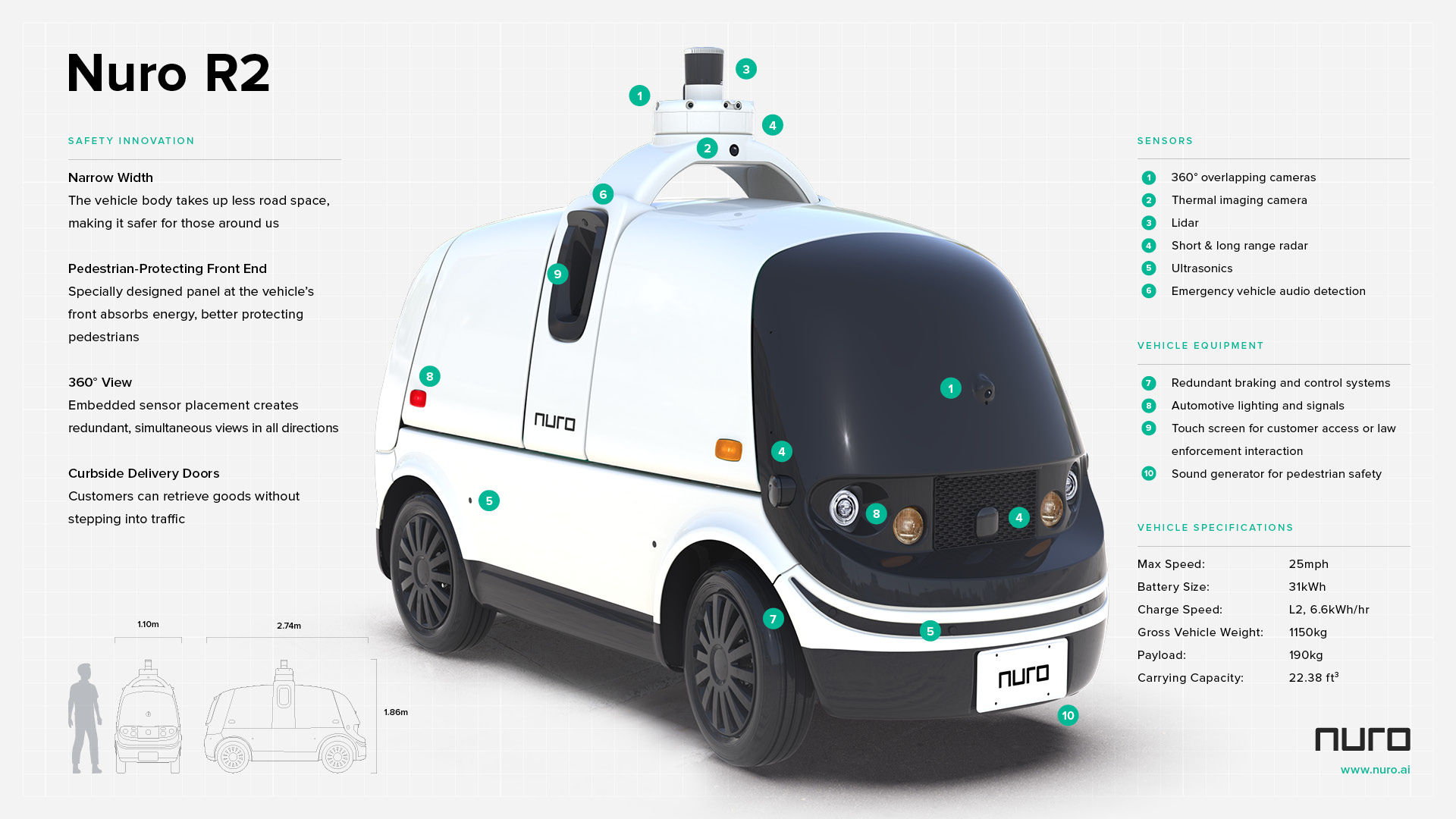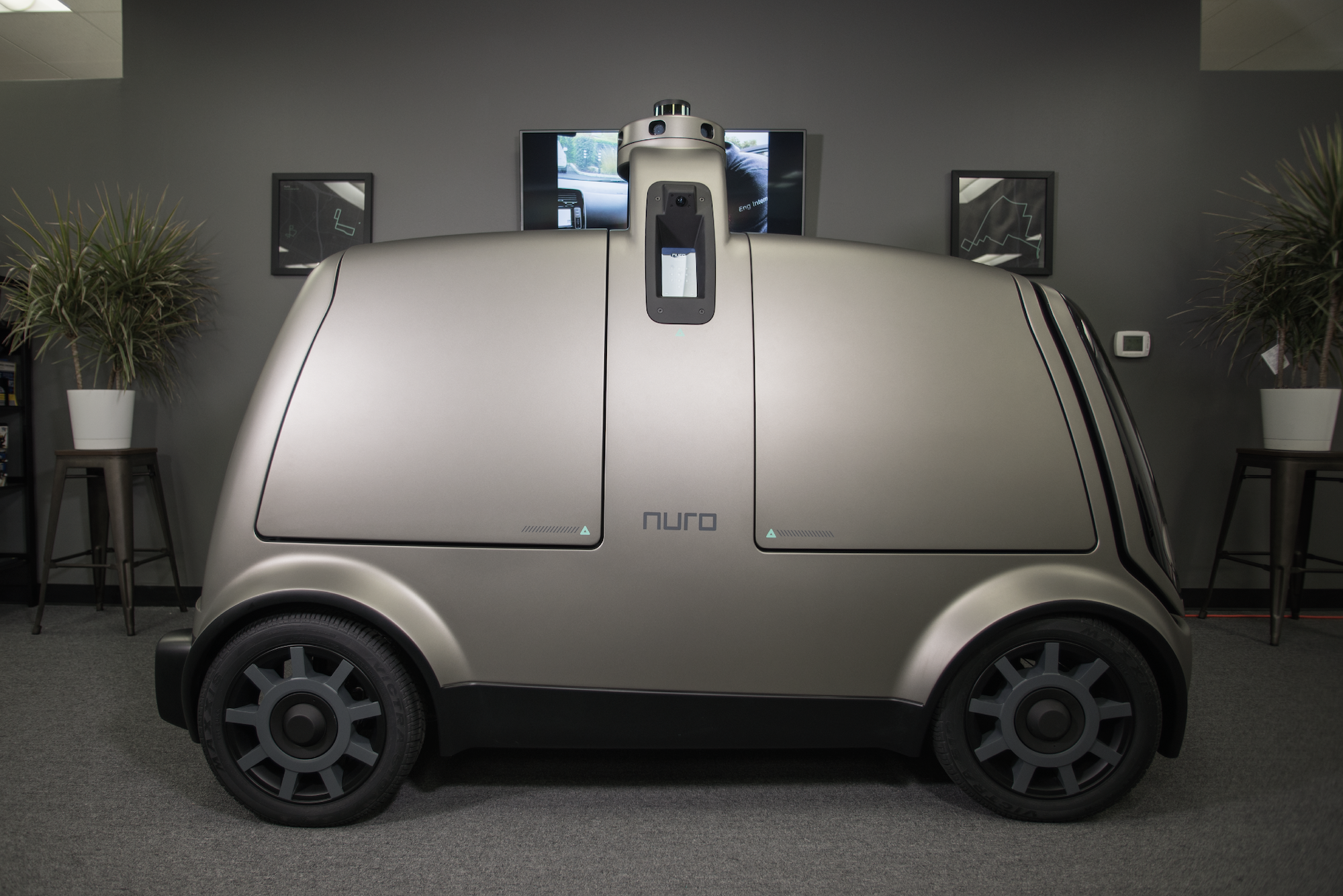Nuro’s delivery autonomous vehicles (AVs) don’t have a human driver on board. The company’s founders Dave Ferguson (president) and Jiajun Zhu’s (CEO) vision of a driverless delivery vehicle sought to do away with a lot of the stuff that is essential for a normal car to have, like doors and airbags and even a steering wheel. They built an AV that spared no room in the narrow chassis for a driver’s seat, and had no need for an accelerator, windshield or brake pedals.
So when the company petitioned the U.S. government in 2018 for a minor exemption from rules requiring a rearview mirror, backup camera and a windshield, Nuro might have assumed the process wouldn’t be very arduous.
They were wrong.
In a 2019 letter to the U.S. Department of Transportation, The American Association of Motor Vehicle Administrators (AAMVA) “[wondered] about the description of pedestrian ‘crumple zones,’ and whether this may impact the vehicle’s crash-worthiness in the event of a vehicle-to-vehicle crash. Even in the absence of passengers, AAMVA has concerns about cargo ejection from the vehicle and how Nuro envisions protections from loose loads affecting the driving public.”
The National Society of Professional Engineers similarly complained that Nuro’s request lacked information about the detection of moving objects. “How would the R2X function if a small child darts onto the road from the passenger side of the vehicle as a school bus is approaching from the driver’s side?” it asked. It also recommended the petition be denied until Nuro could provide a more detailed cybersecurity plan against its bots being hacked or hijacked. (Nuro refers to the bots as. R2, but in some written documents reviewed by TechCrunch, the term R2X is used)
The Alliance of Automobile Manufacturers (now the Alliance Automotive Innovation), which represents most U.S. carmakers, wrote that the National Highway Transportation Safety Agency (NHTSA) should not use Nuro’s kind of petition to “introduce new safety requirements for [AVs] that have not gone through the rigorous rule-making process.”
“What you can see is that many comments came from entrenched interests,” said David Estrada, Nuro’s chief legal and policy officer. “And that’s understandable. There are multibillion dollar industries that can be disrupted if autonomous vehicles become successful.”
To be fair, critical comments also came from nonprofit organizations genuinely concerned about unleashing robots on city streets. The Center for Auto Safety, an independent consumer group, thought that Nuro did not provide enough information on its development and testing, nor any meaningful comparison with the safety of similar, human-driven vehicles. “Indeed, the planned reliance on ‘early on-road tests … with human-manned professional safety drivers’ suggests that Nuro has limited confidence in R2X’s safe operation,” it wrote.

Despite such concerns, the National Highway Traffic Safety Administration (NHTSA) granted Nuro the exemptions it sought in February last year. Up to 5,000 R2 vehicles could be produced for a limited period of two years and subject to Nuro reporting any incidents, without a windshield, rearview mirror or backup camera. Although only a small concession, it was the first — and so far, only — time the U.S. government had relaxed vehicle safety requirements for an AV.
Now Estrada and Nuro hope to use that momentum to chip away at a mountain of regulations that never envisaged vehicles controlled by on-board robots or distant humans, extending from the foothills of local and state government to the peaks of federal and international safety rules.
If Nuro is to become the generation-defining company its founders desire, it will be due as much to innovation in regulation as advances in the technology it develops.
Regulate for success
“I don’t think any of the credible, big AV players want this to be a free-for-all,” said Dave Ferguson, Nuro’s co-founder and president. “We need the confidence of a clear regulatory framework to invest the hundreds of millions or billions of dollars necessary to manufacture vehicles at scale. Otherwise, it’s really going to limit our ability to deploy.”
Estrada is familiar with the challenges of scaling new modes of transport. He was at Google when the company started working on self-driving cars, and in 2011 worked on the first state law, in Nevada, to license AVs. He then moved to ride-sharing at Lyft, air taxis at Kitty Hawk and electric scooters at Bird — each time tasked with clearing the path for a new, highly disruptive transportation technology.
That process generally splits into two categories, Estrada noted. “Regulatory compliance is looking at the laws that currently exist and seeing how we can release our product in compliance with them. And then if our product really can’t fit into existing regulations, we need to work on public policy development — getting those rules changed,” he said.
At Nuro, the easiest way forward seemed to be designing the bot as a low-speed vehicle (LSV) — a category under Federal Motor Vehicle Safety Standards (FMVSS) today dominated by street-legal golf carts. LSVs must weigh less than 3,000 pounds and have a top speed of just 25 mph, but can dispense with safety features like airbags, windshield wipers and even doors.
In most respects, the LSV designation was ideal for Nuro’s vision of a safe, neighborhood delivery robot. “It’s simply science that a slower, lighter vehicle is safer for people outside of the vehicle,” Estrada said. “The LSV category fit very well with what we wanted to do and it wasn’t too much trouble achieving the weight limit.”
However, LSVs are still required by FMVSS to have features designed for human drivers and passengers, such as safety belts, mirrors, instrument dials and driving controls. “When you get rid of all of those things, you make room for a compartment that is highly customized to fit goods,” Estrada said. “You also shed weight, which is not only good for becoming a LSV, it’s good for making the vehicle safer in case of an impact.”

Building a bot with all the FMVSS bells and whistles on board wasn’t difficult — Estrada said the company has made several — but it did provide a low-risk way for Nuro to start interacting with regulators. “We could get up and running, and have a very compelling business as an LSV without having exemptions,” he said. “But we sought exemptions for a couple of very small issues to determine how the process would work out.”
And the process worked out just fine. Nuro got its FMVSS exemption from NHTSA, which punted on safety concerns regarding the bot’s autonomous driving software. “Neither the statute nor regulations call upon NHTSA to assess the absolute level of safety of the exempted vehicle,” wrote NHTSA. “Instead, the agency is tasked with making a judgment about relative safety, i.e., whether an exempted, noncompliant version of a highly automated R2X would have a level of safety equivalent to that of a nonexempt, compliant version of a highly automated R2X.”
In essence, regardless of the bot’s driving ability, NHTSA was only interested if removing the windshield and mirrors would make it more dangerous.
NHTSA is now working on revising FMVSS standards for all AVs, including passenger vehicles, to address which hardware is still required without a human behind the wheel. While that process is likely to take at least another year, there seem to be few partisan hurdles. “We worked really well with the previous [presidential] administration and we’re excited to work with the new administration on this,” Ferguson noted.
More significant rules regarding autonomous driving systems and the overall safety of AVs will have to wait for future regulations. Ultimately, Estrada hopes that AV regulation will look less like the FMVSS, which specifies individual pieces of equipment rather than a performance-based system that enables the end goals of safety and reliability.
“Federal aviation rules ensure that aircraft innovation happens very, very slowly, because they have something called type certification, which says: Here is exactly what this kind of aircraft looks like, and here’s what all of the parts look like,” Estrada explained. “We believe NHTSA has already embraced the idea of performance standards instead, which is far more scalable.”
Nuro is supporting bipartisan work in the U.S. Senate to fund and help the Department of Transportation to gain expertise at determining appropriate national regulations for AV safety, and then to put them into place.
“The whole AV industry is behind this effort to create a clear national framework for autonomous technology safety standards,” Estrada said. “What nobody wants is a state-by-state patchwork where, because the federal government doesn’t put in place a clear national framework, a lot of individual states do. This could make it impossible to put out a product that’s the same from state to state.”
Bots behind the wheel
In fact, most of the AV regulatory action today is happening at the state level, and that’s because of the way that the U.S. divides responsibility for motoring. The federal government decides which vehicles can be marketed, but the states decide who can drive within their borders.
“Because all AV companies are replacing the driver, states are always going to have a very strong role to play in determining how autonomous vehicles must behave on our roads,” Estrada said.
Nuro’s home state of California is probably the furthest along in terms of having written rules for AV companies to follow. In December last year, Nuro became the first company to receive an Autonomous Vehicle Deployment Permit, enabling it to launch the state’s first commercial AV service.
“We spent some time talking to the California DMV about what they’d like to see in our application for deployment,” Estrada recalled. “We wanted to work collaboratively with them on safety, operations and the locations where we’d be active. This being the first one, they were making it up with us in terms of how would we work together going forward.”
Nuro has yet to begin that deployment, and Estrada would not share the name of its partner. When operations do start, Nuro will have to share trip data with the DMV as well as details of any accidents or incidents.
“We don’t have any concerns about supplying that information,” Estrada said. “We have a responsibility to report accidents so that they can appropriately respond. And they have the authority to revoke or suspend a permit so they can perform an investigation.”
Nuro has been less keen for the public to learn of any such events, however. In a letter to NHTSA in 2019, Nuro asked that the number and details of any injury-causing accidents be treated as confidential business information. “The disclosure of this information would be likely to reveal competitively valuable information about Nuro’s operational capacities and its approach to testing innovative products,” it wrote. “This information is likely to retain its competitive value (and its potential to inflict substantial competitive harm upon Nuro) for several years.”
Like many tech and transportation companies, Nuro has hired lobbyists in Washington, D.C. and some of the states in which it is currently (or plans to be) operating, public records show.
This public policy work can be very effective. In December 2020, for example, the Texas House Committee on Transportation prepared a report on AVs that used text identical to a letter written by Nuro, citing the benefits of zero-occupancy AVs and recommending the relaxation of restrictions on them.
The Nevada legislature passed a bill in March 2021 permitting Nuro’s bots (and similar autonomous LSVs) to travel on roads with speed limits of 45 mph. This will allow them to reach some urban food deserts and potentially expand operations to suburban and rural areas, a Nuro spokesperson testified. Similar bills, also supported by Nuro, are in process in Texas and Florida.
“When you’re putting out a vehicle that’s going to operate down a street with kids playing, it’s important to get to know the neighborhood and the people,” Estrada said. “Make sure there’s a common understanding of the value that you’re bringing before you decide to put a product on the road.”
“It’s really important the regulatory side keeps up with the innovation”
Nuro is prepared to work much more on regulation as its technology rolls out. Some pressure groups would like AV teleoperators — or guardian operators, as Nuro calls them — to be licensed or certified by states. Nuro would prefer not to go down that road.
“We think remote operation will largely be regulated as part of the full stack of autonomy, where it will be looked upon as backup safety technology,” Estrada said. “There haven’t been any laws passed in any states yet that pull the two apart and create any form of license for a remote operator.”
There is also the possibility that Nuro’s competitors, or legacy operators, will attempt to use rules to keep robot deliveries at arm’s length. “How are businesses that you’re disrupting going to protect against that disruption?” asks Estrada. “And how can you prevent people from interfering with the vehicles on the street? There will be challenges for us along the way as these bots become a normal part of society.”
While some new rules, like removing unnecessary features from its vehicles, can help Nuro’s mission, regulators and politicians can always throw tech startups curve balls. Minimizing the impact of those is Estrada’s mission in the years ahead.
“It’s possible that regulations could provide a real impediment to us,” said Ferguson, pointing out that there are now multiple vehicles in China that look “suspiciously similar” to the R2.
“We’re at the point where we need a little bit of investment on the regulatory front to make sure that we don’t give up our lead to other countries,” he said. “It’s very personal to me. My Ph.D. was funded by the National Science Foundation and the Urban Challenge was funded by the Department of Defense. The U.S. has invested so much in the core R&D behind self-driving over many decades that it’s really important the regulatory side keeps up with the innovation.”
But Nuro won’t be able to succeed in its battle to change regulations without the acceptance and help of partners and customers willing to step forward with the company. The COVID-19 pandemic cemented the need for delivery as a nearly essential service, and as we explore in part three of this EC-1, Nuro’s partnerships with giant consumer brands such as Domino’s, Walmart and Kroger are set to help pave the path to innovation in delivery services.
Nuro EC-1 Table of Contents
- Introduction
- Part 1: Origin story
- Part 2: Regulations
- Part 3: Partnerships
- Part 4: Operations
Also check out other EC-1s on Extra Crunch.































Comment